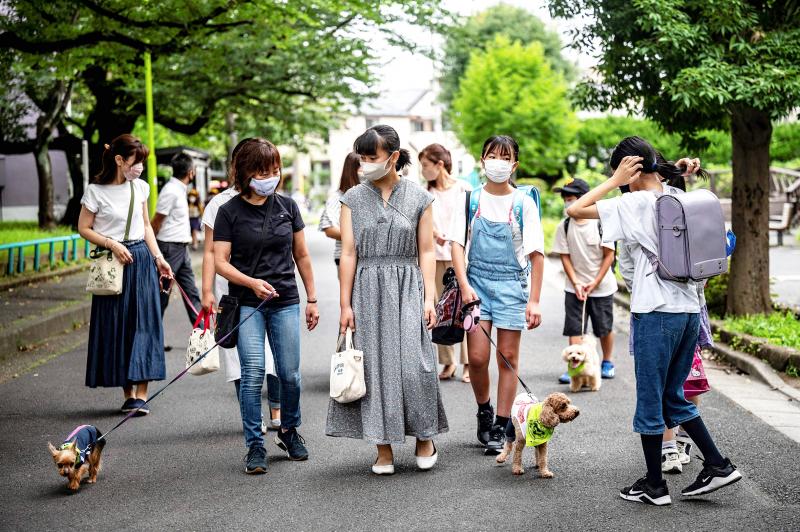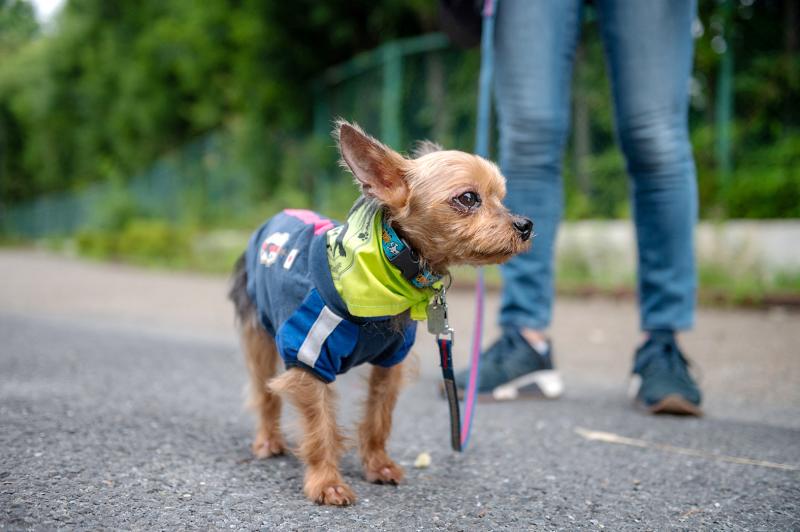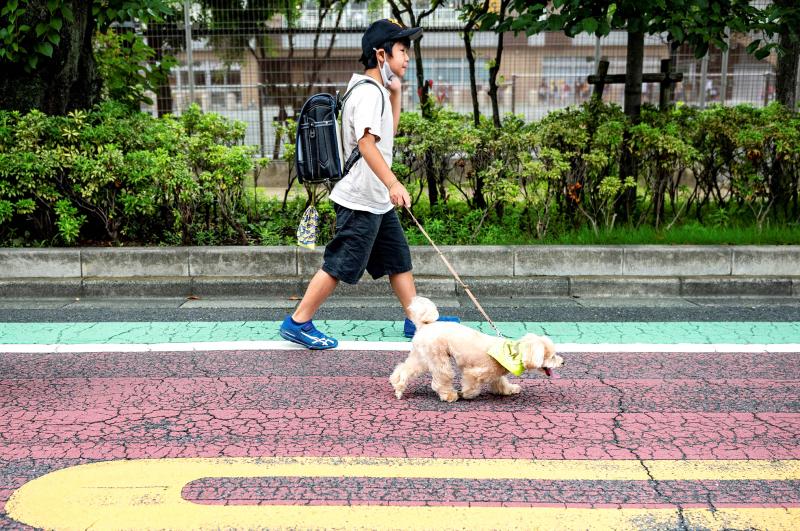It’s a neighborhood watch with a difference. A clean-nosed crew, sniffing out trouble and keeping the streets safe for school kids: meet the pups of Tokyo’s real-life Paw Patrol.
They might not have the gadgets and gear of their beloved cartoon counterparts, but the dogs of the Wan-Wan (“bow-wow”) Patrol are firm favorites in Tokyo’s Karasuyama neighborhood.
Twelve-year-old Yurika Igarashi counts on seeing Sakura, a fluffy toy poodle, when she’s on her way home from school.

Photo: AFP
“Sometimes I’m scared when I’m coming home alone, but I feel okay when I’m walking with Wan-Wan Patrol,” she said, gently cradling Sakura on her lap.
Sakura is one of 150 pups who form the Wan-Wan Patrol, a program that enlists dogs and their owners to turn their daily walks into a neighborhood watch, monitoring children, looking out for residents and helping deter crime.
The Karasuyama program is one of the oldest such community initiatives in Japan and was founded by a local police officer.

Photo: AFP
“Individual owners walk whenever they can and have their dog wear the same scarf,” said Keiko Shimizu, the patrol’s current leader.
Clearly marked canines patrolling the streets means “we can help make the neighborhood less prone to crime,” she added.
Many of the dog owners are parents of current and former students of the local school, but others just participate in the community watch as residents.

Photo: AFP
On one recent morning, five pooches in Wan-Wan Patrol’s lime-green neckerchiefs wagged their tails as they accompanied children going to elementary school.
Pu, a 17-year-old shih tzu, is one of the oldest members of the patrol and can no longer walk by herself. But she proudly participates from the comfort of a doggy stroller pushed by her owner.
‘CAREFREE’ PLAY
“The program helps us get to know each other and become good neighbors, and I feel this place stays safe that way,” said Michiko Takeuchi, owner of poodle and Maltese mix Kojiro, and mother to a local schoolboy.
And the patrol isn’t just for show.
“We had a member who found an elderly person who had passed away alone,” patrol leader Shimizu said. “They realized by noticing a room light still on in the morning. We walk at around the same hours on the same route everyday, so it’s easier for us to notice if there is something unusual.”
Japan has a reputation as one of the world’s safest countries, with very low rates of violent crime.
But there are occasional tragedies, including a devastating accident last month east of Tokyo in which a drunk driver crashed his truck into a group of schoolchildren, killing two.
Jun Ameie, principal at the local Kyuden Elementary School, said the neighborhood watch helps reassure parents and children alike.
“Parents appreciate that many people in the neighborhood care and make sure the environments safe, especially these days when we hear a lot of reports about crimes involving children,” he said.
“I’m sure that children can play carefree outside of school and anywhere in the neighborhood, because they know many adults keep their eyes on their safety,” Ameie added.
For young Igarashi, the cuddly canines are a reliable source of comfort.
“Of course, it’s fun to walk with the dogs, but I also feel protected by them.”

The entire saga involving the Taiwan People’s Party (TPP) and its Chairman Ko Wen-je (柯文哲) continues to produce plot twists at such a rapid pace that fiction publishers would throw it out for being ridiculously improbable. This past week was particularly bizarre, but surprisingly the press has almost entirely ignored a big story that could have serious national security implications and instead focused on a series of salacious bombshell allegations. Ko is currently being held incommunicado by prosecutors while several criminal investigations are ongoing on allegations of bribery and stealing campaign funds. This last week for reasons unknown Ko completely shaved

Gabriel Gatehouse only got back from Florida a few minutes ago. His wheeled suitcase is still in the hallway of his London home. He was out there covering the US election for Channel 4 News and has had very little sleep, he says, but you’d never guess it from his twinkle-eyed sprightliness. His original plan was to try to get into Donald Trump’s election party at Mar-a-Lago, he tells me as he makes us each an espresso, but his contact told him to forget it; it was full, “and you don’t blag your way in when the guy’s survived two

The self-destructive protest vote in January that put the pro-People’s Republic of China (PRC) side in control of the legislature continues to be a gift that just keeps on giving to the Chinese Nationalist Party (KMT). Last week legislation was introduced by KMT Legislator Weng Hsiao-lin (翁曉玲) that would amend Article 9-3 of the Act Governing Relations Between the People of the Taiwan Area and the Mainland Area (臺灣地區與大陸地區人民關係條例) to permit retired and serving (!) military personnel to participate in “united front” (統戰) activities. Since the purpose of those activities is to promote annexation of Taiwan to the PRC, legislators

Nov. 18 to Nov. 24 Led by a headman named Dika, 16 indigenous Siraya from Sinkan Village, in what is today’s Tainan, traveled to Japan and met with the shogun in the summer of 1627. They reportedly offered sovereignty to the emperor. This greatly alarmed the Dutch, who were allies of the village. They had set up headquarters on land purchased from the Sinkan two years earlier and protected the community from aggressive actions by their more powerful rivals from Mattau Village. The Dutch East India Company (VOC) had been embroiled in a bitter trade dispute with Japan, and they believed